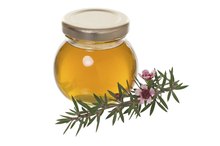Vitamins in Raw Honey
Honey has been valued for millennia; in ancient times its sweet taste was considered a gift from the gods. It has had a wide range of spiritual, cosmetic and medicinal uses. Today raw honey is still popular because of its many nutritional benefits including its high vitamin content 1. Raw honey is nutritionally superior to processed honey because processing significantly reduces the nutritional content.
Vitamin C
Raw honey is rich in vitamin C. Medical experts believe vitamin C to be one of the most effective vitamins available to humans. It boosts the immune system, helping to protect the body from infections and disease. Vitamin C is also great for the skin and can be topically absorbed. This means that raw honey can be smoothed onto the skin as a face cleanser and also to ease topical symptoms such as burns, rashes and dry skin.
- Raw honey is rich in vitamin C. Medical experts believe vitamin C to be one of the most effective vitamins available to humans.
- It boosts the immune system, helping to protect the body from infections and disease.
Vitamin B6
Is Honey Bad for the Diet?
Learn More
Raw honey also has a high Vitamin B6 content. This vitamin is important to the human body as it is involved in chemical reactions that take place each minute. Vitamin B6 is actually a group of three different vitamins; pyridoxamine, pridoxal and pyridoxine. This combination works in tandem with enzymes within the body to ensure that your body’s metabolism is functioning properly.
- Raw honey also has a high Vitamin B6 content.
- This vitamin is important to the human body as it is involved in chemical reactions that take place each minute.
Vitamin B3
Vitamin B3 or Niacin is also found in raw honey. Niacin can help to reduce levels of bad cholesterol or LDL, low-density lipoproteins, and also increase levels of beneficial cholesterol or HDL – high density lipoproteins.
Vitamin B2
Clover Vs. Alfalfa Honey
Learn More
Raw honey contains vitamin B2, also known as riboflavin. Riboflavin is a water-soluble vitamin that helps to fuel the body’s energy by converting carbohydrates into sugar. It also helps with the break down of fats and amino acids.
Vitamin B1
Vitamin B1, or thiamin, is also present in raw honey. Thiamin helps to break down carbohydrates to fuel the body. It also neutralizes free radicals which can compromise the immune system and speed up the aging process.
Vitamin B5
Raw honey contains vitamin B5, also known as pantothenic Acid. Vitamin B5 is present in your blood plasma where it maintains the balance of hormones and keeps the nervous system in top condition.
Related Articles
References
- World of Diets: Health Benefits of Honey
- Health Vitamins Guide: Benefits of Vitamins
- U.S. Department of Agriculture. Honey. FoodData Central. 2019.
- Cianciosi D, Forbes-Hernández TY, Afrin S, et al. Phenolic Compounds in Honey and Their Associated Health Benefits: A Review. Molecules. 2018;23(9):2322. doi:10.3390/molecules23092322
- Oduwole O, Udoh EE, Oyo-Ita A, Meremikwu MM. Honey for acute cough in children. Cochrane Database Syst Rev. 2018;4:CD007094. doi:10.1002/14651858.CD007094.pub5
- Pasupuleti VR, Sammugam L, Ramesh N, Gan SH. Honey, Propolis, and Royal Jelly: A Comprehensive Review of Their Biological Actions and Health Benefits. Oxid Med Cell Longev. 2017;2017:1259510. doi:10.1155/2017/1259510
- Aguiar R, Duarte FC, Mendes A, Bartolomé B, Barbosa MP. Anaphylaxis caused by honey: A case report. Asia Pac Allergy. 2017;7(1):48-50. doi:10.5415/apallergy.2017.7.1.48
- American Academy of Pediatrics. Botulism. HealthyChildren.org. Updated November 19, 2018.
- National Honey Board. Honey Varietals. 2020.
Resources
Writer Bio
Corinna Underwood began writing in 2000. She has been published in many outlets, including Fox News, “Ultimate Athlete,” “Hardcore Muscle,” “Alternative Medicine” and “Alive.” Underwood also wrote "Haunted History of Atlanta and North Georgia" and "Murder and Mystery in Atlanta." She has a Bachelor of Arts in English literature and philosophy and a Master of Arts in women’s studies from Staffordshire University.









